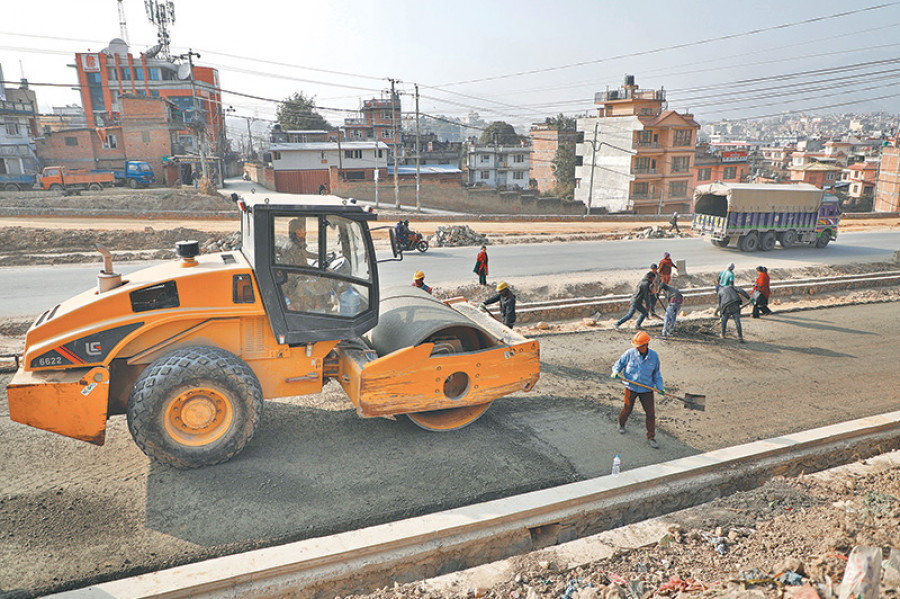Valley
Second phase of Kathmandu Ring Road expansion remains uncertain
Though the Ministry of Physical Infrastructure has directed concerned authorities to clear the 8.2 km road within three months, officials say it is not easy to do so.
Anup Ojha
Last year in October, officials at the Department of Roads had said the second phase of expansion of the 8.2km Kalanki-Balaju-Maharajgunj road section would start from early 2020. A year has passed since and there has been no progress on the project.
The Ministry of Physical Infrastructure and Transport on Sunday directed the concerned stakeholders to start the road clearance work to make way for the project.
A meeting chaired by Minister of Physical Infrastructure and Transport Basanta Kumar Nembang directed the authorities concerned to remove the electricity poles along the proposed road expansion site within a month, relocate the high voltage transmission line between Karkhana Chowk and Sano Bharyang, remove the Chaitya in front of Swayambhu Park by mid-November, and compensate the landowners whose properties fall on the road expansion site.
The directive from the ministry comes after Chinese government, which is funding the project, said it will not start its work until the road section is cleared, according to Shiva Hari Sapkota spokesperson at the Department of Roads.
“This task will take a minimum of three months, and we need to look at the Detailed Project Report prepared by the construction company before starting the expansion work,” said Sapkota.
A senior official at the department, however, told the Post that even though the ministry has issued a directive to clear the road section by three months, the Chinese government is unlikely to start the road expansion project anytime soon because of the Covidp-19 pandemic.
Kathmandu has become a Covid-19 hotspot and the Chinese government is unlikely to take a risk by starting the road expansion project, said the official who wished to remain anonymous.
A total of 2,283 new Covid-19 cases were detected in Kathmandu Valley on Monday. Of which 1,888 were in Kathmandu, 227 in Lalitpur and 118 were in Bhaktapur.
Nepal’s Covid-19 infection numbers crossed 100,000 mark last week. At this point, there is little chance that the road expansion work will start after three months.
Moreover, Kathmandu Ring Road Improvement Project is also without its leadership to spur on the road expansion work. The former project chief, Amrit Mani Rimal, has been transferred and his successor, Arjun Suwal, is set to join office only after the Dashain festival.
Earlier, the Chinese government was expected to submit the project design before 2018. But that has not happened more than two years down the line.
Officials say the Chinese side wants the road clearance and land acquisition works completed before submitting the project design, something the Nepali authorities have failed to deliver.
Last year, the Department of Roads had chopped 200 trees along the proposed road expansion site. The tree felling work, however, got halted after city residents and environmental activists protested the move.
The department says it needs to clear 2,057 trees for the road expansion project.
Ishwor Man Dangol, spokesperson for the Kathmandu Metropolitan City, said the city has been coordinating with the central government to start the project.
“We have been helping the central government in making drainage in some places. But there are still some problems, particularly the one concerning land compensation at Maharajgunj,” Dangol told the Post.
He thinks it would take some time to acquire the roadside property before the expansion work could be initiated.
Bhai Kaji Tiwari, commissioner of Kathmandu Valley Development Authority, said while he was not part of Sunday's meeting, it is clear that the Chinese side is not going to start the project until the road clearance works are settled.
“The Chinese government is not going to start this project if there is any dispute regarding land acquisition,” said Twari.
The 10.5 km Kalanki-Koteshwor section of Ring Road has already been expanded with the assistance of the Chinese government. The undertaking had cost Rs 5.13 billion and took nearly six years to complete.
The Chinese government had officially handed over the expanded road to Kathmandu Ring Road Improvement Project in January last year.
The expanded Ring Road section, however, had courted controversy for its lack of pedestrian-friendly infrastructure, like crosswalks, overhead bridges and lack of cycle lanes. The section was termed a killer road for frequent traffic casualties.




 22.12°C Kathmandu
22.12°C Kathmandu.jpg)













